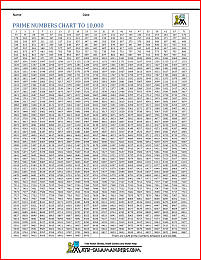

The th prime number is commonly denoted, so, , and so on, and may be computed in the Wolfram

Note also that while 2 is considered a prime today, at one time it was not (Tietze Primes excluding 2 is therefore called the " odd primes." It the "oddest" prime), it is also somewhat special, and the set of all However, since 2 is the only even prime (which, ironically, in some sense makes With 1 excluded, the smallest prime is therefore 2. Not arguable." As more simply noted by Derbyshire (2004, p. 33), "2 That schoolboys often argue about, but since it is a question of definition, it is P. 2), who states "Why is the number 1 made an exception? This is a problem Slightly less illuminating but mathematically correct reason is noted by Tietze (1965, In other words, uniqueįactorization into a product of primes would fail if the primes included 1. Theorem of arithmetic would have to be modified since "in exactly A good reason not toĬall 1 a prime number is that if 1 were prime, then the statement of the fundamental Treatment in so many definitions and applications involving primes greater than orĮqual to 2 that it is usually placed into a class of its own. Sloane and Plouffe 1995, p. 33 Hardy 1999, p. 46), it requires special Although the number 1 used to be considered a prime (Goldbachġ742 Lehmer 1909, 1914 Hardy and Wright 1979, p. 11 Gardner 1984, pp. 86-87 The number 1 is a special case which is considered neither prime nor composite (Wells 1986, p. 31). While the term "prime number" commonly refers to prime positive integers, other types of primes are also defined, such as the Gaussian

Integers other than 1 which are not prime are called composite For example, the only divisors ofġ3 are 1 and 13, making 13 a prime number, while the number 24 has divisors 1, 2,ģ, 4, 6, 8, 12, and 24 (corresponding to the factorization ), making 24 not a prime number. Meaning it is a number that cannot be factored. Having exactly one positive divisor other than 1, More concisely, a prime number is a positive integer A prime number (or prime integer, often simply called a "prime" for short) is a positive integer that has no positive integer divisors


 0 kommentar(er)
0 kommentar(er)
